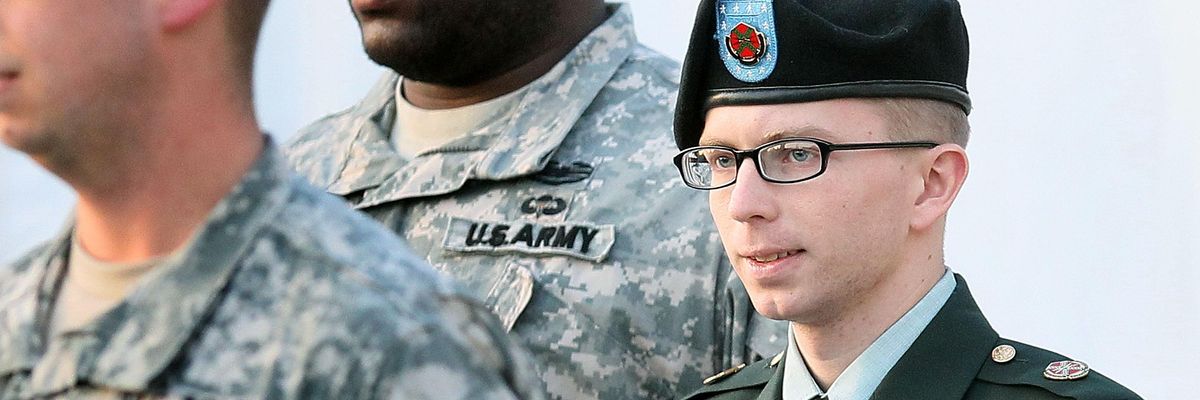As he wraps up his presidency, it's time for Barack Obama to seriously consider pardoning whistleblowers Chelsea Manning and Edward Snowden.
Last week, Manning marked her six-year anniversary of being behind bars. She's now served more time than anyone who has leaked information to a reporter in history - and still has almost three decades to go on her sentence.
It should be beyond question at this point that the archive that Manning gave to WikiLeaks - and that was later published in part by the Guardian and New York Times - is one of the richest and most comprehensive databases on world affairs that has ever existed; its contribution to the public record at this point is almost incalculable. To give you an idea: in just the past month, the New York Times has cited Manning's state department cables in at least five different stories. And that's almost six years after they first started making headlines.
We know now that, despite being embarrassing for the United States, the leaks caused none of the great harm that US government officials said would come to pass. Even the government admitted during Manning's trial that no one died because of her revelations, despite the hyperbolic government comments at the time, including that WikiLeaks had "blood on its hands". (By the way, the US officials knew they were exaggerating in the media at the time.)
Even if you think that she deserves some punishment for breaking the law, six years behind bars (and being tortured during her pretrial confinement) should be more than enough.
Meanwhile, the former attorney general Eric Holder made headlines on Tuesday when he told David Axelrod that Snowden had done a "public service" by sparking a much needed debate about privacy and technology that had not existed before his leaks about the NSA in 2013. Holder said:
We can certainly argue about the way in which Snowden did what he did, but I think that he actually performed a public service by raising the debate that we engaged in and by the changes that we made.
It's funny how former officials have a penchant for telling the truth only after they leave office. Holder thinks Snowden should still face trial, but that the judge should take into consideration the public benefit during sentencing. This is a serious gamble, considering people said the same thing about Manning at the time - and she received 35 years in jail. It's also a reminder of the inherent unjustness of the Espionage Act that Snowden is charged under: he would be barred from telling a jury why he did what he did, or explain the benefits of his leaks until after he was convicted.
Much like Manning, all of the dire consequences that were predicted when Snowden first leaked the NSA files to journalists have not come to pass. And we've seen enormous benefits since: Congress passed a historic NSA reform bill, an appeals court ruled the mass surveillance he exposed illegal, Obama implemented further changes to NSA practices, and tech companies have been using encryption to protect millions of people's privacy where the law falls short.
Unfortunately, the White House is still spouting demonstrably false information in response to Holder. Speaking about his comments on Tuesday, White House spokesman Josh Earnest said: "The fact of the matter is there is a path for whistleblowers to take if they have legitimate concerns about what they are seeing, particularly when it comes to the handling of classified, sensitive information."
Earnest is, to put it charitably, not telling the truth. Snowden was a contractor, and as such, by law, he did not have any of the whistleblower protections that an employee of the NSA would have. It's amazing that the White House is still repeating this lie years after it was debunked.
On top of that, we know that the whistleblower protections in place at the time wouldn't have helped him anyway. Look no further than the compelling investigative piece that Mark Hertsgaard published in the Guardian recently about a former NSA employee in charge of helping whistleblowers who had to become a whistleblower himself after the Pentagon attempted to destroy the life of Thomas Drake, who blew the whistle on NSA spying during the Bush administration.
Maybe the White House is still holding a grudge against Snowden because he exposed its inaction on NSA reform despite Obama's promises (the White House's suggestion on Tuesday that many of these reforms were in motion before Snowden went public is laughable). Or maybe they don't want to seem "weak" to the intelligence community.
But there is precedent for a pardon: Samuel Morrison, the first leaker convicted under the Espionage Act, was pardoned by Bill Clinton during his presidency. Given how powerful figures who have also mishandled or leaked classified information, such as David Petraeus, have gotten off almost scot-free, it's past time the administration did the right thing and made sure these two American heroes can return from exile and prison.

